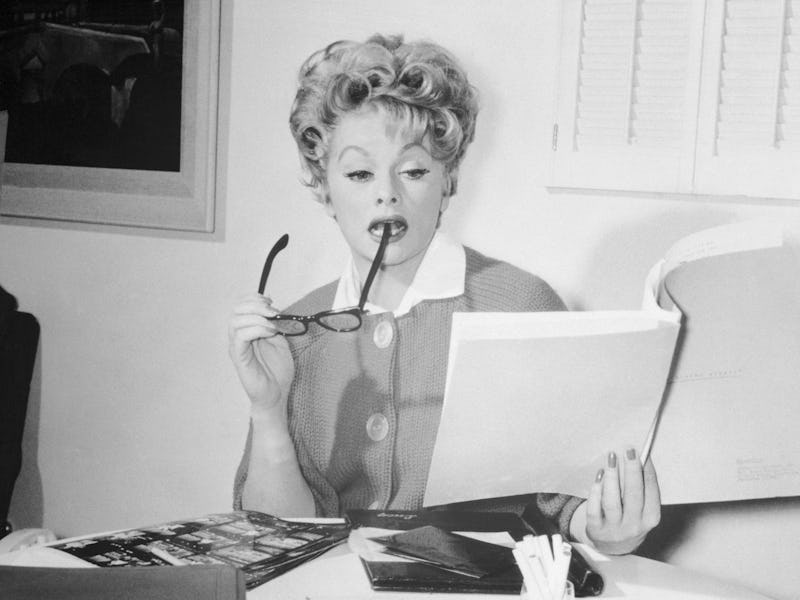New Star Trek documentary reveals Lucille Ball’s surprising sci-fi influence
Without Lucy, we’d never have reached the Final Frontier.

The history of sci-fi owes its existence to the history of sitcoms. While WandaVision recently threw several famous old-school sitcoms into a Marvel blender, the success of Lucille Ball and her sitcom empire back in 1964 allowed for science fiction TV to take a massive leap into the mainstream.
Without I Love Lucy and The Lucy Show, Star Trek — the most pivotal sci-fi series of them all — would have never existed. And thanks to the new History Channel docuseries, this important pioneer in TV history is finally getting the respect she deserves.
The first episode of the new 10-part documentary series The Center Seat, which premiered Friday, focused in part on the history of Lucille Ball and her studio, Desilu Productions (named as a portmanteau of her name and that of husband/co-founder Desi Arnaz).
For the historians, archivists and experts interviewed in the documentary — from Larry Nemecek to John Tenuto, Maria Jose Tenuto, and Marc Cushman — few of its findings are new. But for fans unfamiliar with Star Trek history, it must have been shocking to learn of Ball’s influence on the series. For the first time, Lucille Ball has been identified as a star of Star Trek’s early phases.
Narrated by Gates McFadden of Star Trek: The Next Generation fame, The Center Seat is produced by Brian Volk-Weiss, probably most famous for his other documentary series, The Toys that Made Us. Made with a similarly jaunty vibe, The Center Seat has fun with its parsing its primary sources and offers information dumps in quirk ways. But it’s entirely sincere (and factually correct) in devoting half its premiere’s runtime to Ball’s involvement in the iconic sci-fi franchise.
Were it not for Ball, Star Trek would never have happened. Here are three reasons why:
Lucy and Desi in 1955.
3. Ball needed new series — and Star Trek fit the bill
After her divorce from Arnaz in 1960, Lucille Ball had another hit sitcom that followed I Love Lucy; a somewhat lesser-known series titled The Lucy Show. But although several shows were filmed at Desilu Studios, Ball didn’t have another show that Desilu outright owned. When Desilu producer Herb Solow came to Lucy with Star Trek, she saw an opportunity to snag a show she could call her own.
The cast of Star Trek, after its first season.
2. Lucy and Desi invented reruns
Part of Ball’s foresight in popularizing Star Trek was connected to the fact that she and Arnaz pioneered the concept of reruns with I Love Lucy. Before I Love Lucy, the idea that creators could monetize reruns of TV series was unheard of. In The Center Seat, historian Marc Cushman makes it clear that what Lucille Ball wanted from her producers at Desilu Studios was to “bring me a show that can rerun as long as I Love Lucy.”
Although Star Trek: The Original Series was canceled after only three seasons, its availability for reruns in the 1970s — and beyond — is what kept the franchise alive.
Leonard Nimoy as Spock in the SECOND pilot episode for Star Trek, “Where No Man Has Gone Before.”
1. Ball greenlit Star Trek after its pilot failed
The Center Seat claims that Ball was “the mother” of Star Trek. Is this true? Short answer: yes!
Although Ball wasn’t involved in the creative side of Trek, she was pivotal in financing the series. As the experts in The Center Seat make clear, what makes Ball’s support of Trek so unusually historic is that she refinanced a second pilot episode after the first episode — “The Cage” — was rejected outright. As Gates McFadden says in the documentary: “Lucy was only too happy to put her money where her famous mouth was.”
The idea that Desilu Studios would put up money for a second pilot, “Where No Man Has Gone Before,” was unheard of in 1965. (It’s equally unheard of now.) As McFadden says at the end of the first episode, “Without the bravery and determination of Lucille Ball, who defined Hollywood and expectations, well, Star Trek probably wouldn’t exist at all.”
The Center Seat will air the first four episodes of the 10-part series on the History Channel on Fridays. Six additional episodes are also available on History Vault, the network’s subscription video service.